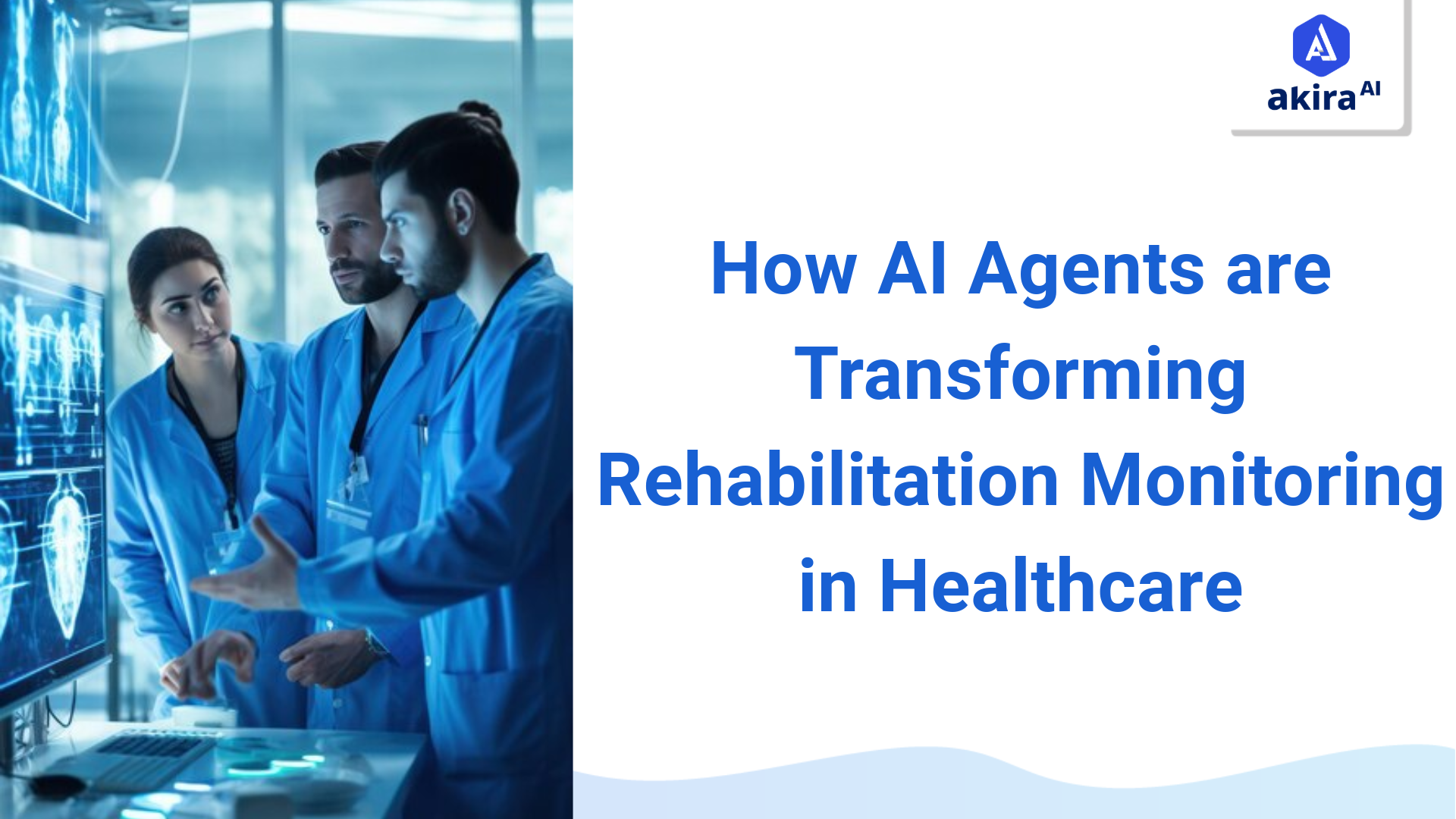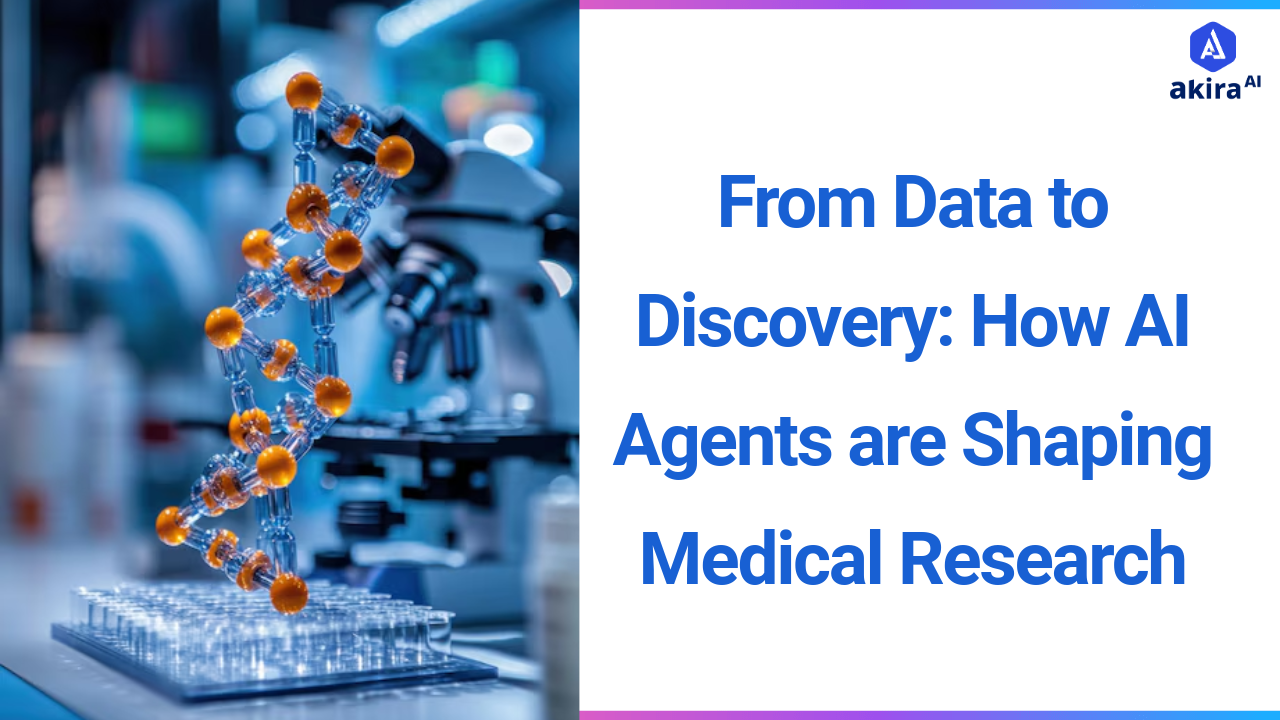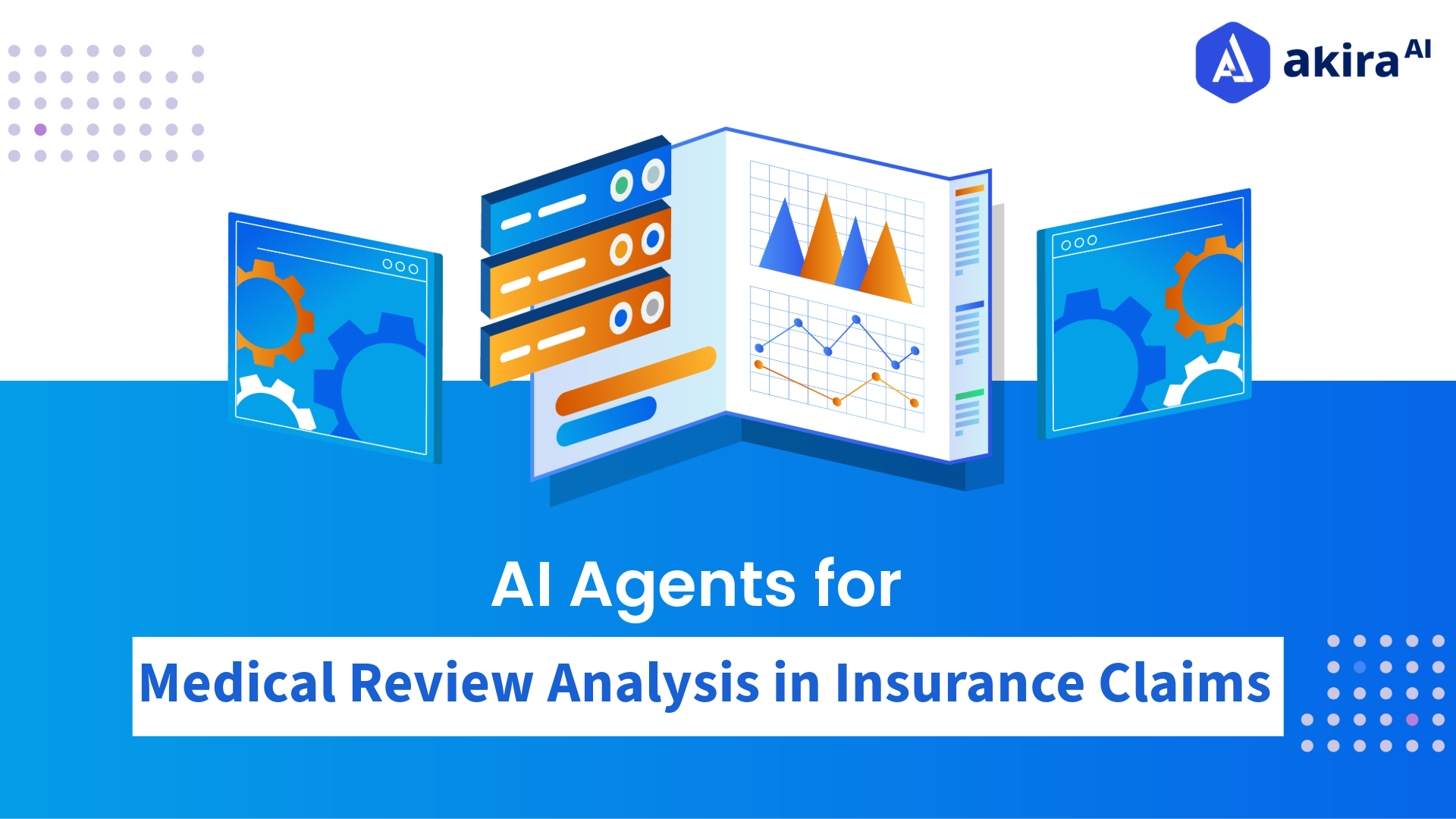Delays in medical review for insurance claims can seriously impact an insurer’s ability to make timely, accurate decisions. These delays not only affect claims processing times but can also lead to inaccuracies in assessments, inconsistencies in approvals, and elevated operational costs. As the volume of healthcare claims continues to rise, the need for faster, more reliable reviews has become crucial for insurers aiming to manage costs effectively, ensure compliance, and deliver quality service to policyholders. Understanding the challenges of traditional review methods and exploring the transformative potential of AI agents is essential for insurers who want to streamline claim workflows, enhance accuracy, and drive better business outcomes.
In this blog, we'll explore how AI agents are stepping up to address these issues, automating complex review processes and enabling insurers to make smarter, faster decisions.
What is Medical Review Analysis in Insurance Claims?
Medical review analysis evaluates healthcare claims to ensure appropriate medical care delivery and cost management. This process involves examining medical records documentation, treatments, prescribed medications, and insurance policy compliance. The analysis determines claim validity coverage applicability and payment amounts.
A well-executed medical review process protects both insurers and patients. It prevents fraudulent claims, ensures appropriate healthcare delivery, and maintains fair cost distribution. This process requires extensive medical knowledge, regulatory compliance, understanding, and attention to detail.
A Brief Overview of AI-based Medical Review Analysis in Insurance Claims
Agentic AI medical review analysis leverages artificial intelligence to optimize the process of reviewing insurance claims, particularly those involving medical data. By utilizing advanced machine learning algorithms and natural language processing (NLP), AI systems can efficiently process and analyze vast amounts of medical data—such as clinical notes, prescriptions, and diagnostic records—that would otherwise require manual review. This enables insurers to automate tasks like data extraction, verification of medical information, and detecting anomalies, thereby reducing human workload while improving the speed and consistency of the review process.
Why is it important?
-
Faster Processing: AI automates claim reviews, significantly reducing the time needed to process claims and speeding up decision-making.
-
Lower Costs: By reducing manual review work, AI lowers operational costs and helps insurers allocate resources more efficiently.
-
Higher Accuracy: AI reduces human errors and ensures consistent, reliable evaluations across all claims, improving overall accuracy.
-
Better Compliance: AI helps insurers stay compliant with evolving regulations, ensuring transparent and accountable decision-making processes.
-
Improved Satisfaction: Quicker and more accurate claim resolutions lead to higher customer satisfaction and increased trust in the insurer’s services.
Traditional vs. Agentic AI Medical Review Analysis
|
Aspect |
Traditional Medical Review Analysis |
Agentic AI Medical Review Analysis |
|
Document Processing |
Manual document review by medical professionals |
Automated document processing with NLP |
|
Processing Time |
7-10 days average processing time |
Same-day processing capability |
|
Decision Making |
Human bias in decision-making |
Consistent objective analysis |
|
Scalability |
Limited scalability |
Handles multiple claims simultaneously |
|
Cost Structure |
High operational costs |
Significantly reduced processing costs |
|
Error Rate |
Prone to human error |
High accuracy with machine learning |
|
Processing Method |
Sequential processing |
Parallel processing of multiple aspects |
Multi-Agent in Action for Medical Review Analysis in Insurance Claims
 Fig1: Agentic Workflow of Medical Review Analysis in Insurance Claims
Fig1: Agentic Workflow of Medical Review Analysis in Insurance Claims
-
Claims Intake Agent: This agent is the first point of contact for new claims, handling initial document screening using OCR and NLP. It validates documents, registers claims, and assigns priority based on complexity, converting unstructured data into structured formats for further processing.
-
Medical Document Analysis Agent: This agent analyzes clinical documentation, interpreting medical reports, diagnostic results, and treatment plans using NLP and medical knowledge bases. It extracts key clinical information and creates structured summaries for efficient processing.
-
Clinical Protocol Verification Agent: This agent checks the medical necessity and treatment appropriateness by comparing prescribed treatments with clinical guidelines. It ensures treatments align with healthcare best practices through protocol matching and verification.
-
Policy Compliance Agent: This agent verifies claims against insurance policies, examining coverage, limits, and exclusions. It calculates benefits, validates eligibility, and ensures claims meet policy terms and regulatory requirements.
-
Decision Synthesis Agent: This agent integrates analyses from all agents, applies decision rules, and generates final recommendations. It ensures consistency and accuracy in claim decisions, providing clear justification for determinations.
Use-cases and Applications of Medical Review Analysis
-
Automated Claims Processing: Insurers streamline the claims process by automating repetitive tasks, verifying eligibility, checking documentation, and prioritizing cases based on complexity—achieving faster processing times and reduced administrative costs through AI-driven solutions.
-
Clinical Protocol Validation: Treatment plans are validated against clinical standards to ensure accuracy and alignment with best practices. This verification of medical necessity and compliance with clinical guidelines improves decision quality in claim approvals.
-
Fraud Detection: Intelligent agents detect potential fraud by identifying suspicious billing patterns, flagging mismatches between diagnoses and treatments, and analyzing historical data to uncover inconsistencies—helping insurers mitigate fraud risks more effectively.
-
Policy Compliance: Claims processing aligns with policy terms by verifying coverage, calculating benefits accurately, and applying limits and deductibles, reducing errors and enhancing overall compliance.
Operational Benefits of Medical Review Analysis
Enhanced Accuracy: AI agents consistently maintain accuracy levels above 95% in claim assessments, reducing processing errors by up to 30%. This precision helps insurers avoid costly mistakes, improving both financial outcomes and customer trust.
Cost Efficiency: By automating labor-intensive tasks, AI reduces operational expenses by 40-60%, enabling insurers to achieve significant cost savings. The ROI for AI implementations in claims processing can range from 200% to 400% within the first year, depending on scale and usage.
Scalability: The systems easily scale to handle increases in claim volumes, such as during seasonal surges, without requiring additional staff or resources. This scalability enables insurers to process 2-3x more claims while maintaining high-quality service.
Fraud Detection and Prevention: AI’s fraud detection capabilities identify and prevent up to 90% of fraudulent claims, significantly lowering losses from false claims. Early fraud detection contributes to ROI by safeguarding funds that might otherwise be lost to fraudulent activities.
Consistent Decision-Making: It provides standardized claim assessments, reducing inconsistencies in claim outcomes by up to 50%. This leads to fairer, more transparent processing, which is crucial for maintaining policyholder trust and brand integrity.
Customer Satisfaction: With up to a 70% reduction in processing delays, AI enables quicker, more accurate claim resolutions, enhancing overall customer satisfaction. Satisfied customers lead to a higher retention rate, potentially improving long-term customer loyalty by 20%.
Technologies Transforming in Medical Review Analysis
-
Natural Language Processing (NLP): NLP allows AI to process and understand unstructured text within medical documents, extracting essential information and context. It helps interpret clinical notes, diagnoses, and treatment details, enabling efficient claims processing and enhancing accuracy.
-
Machine Learning (ML) Models: ML models analyze historical claim data to identify patterns and make predictions. These models are used for detecting anomalies, predicting outcomes, and automating the decision-making process, improving the speed and accuracy of claims assessment.
-
Computer Vision: Computer vision enables AI Agents to process and interpret visual data, such as scanned medical documents and images. It helps convert handwritten or printed materials into digital formats and analyzes medical images like X-rays, extracting critical data for claims review.
-
Expert Systems: Expert systems use predefined rules and decision-making logic to automate claims processes. They ensure that claims adhere to medical guidelines, verify medical coding accuracy, and interpret insurance policies, improving consistency and compliance in claim assessments.
Future Trends of Medical Review Analysis
-
Advanced AI Integration: Neural networks and deep learning will enhance decision-making, enabling AI to understand complex medical scenarios and interpret medical context with near-human accuracy.
-
Real-time Processing Capabilities: Claims will be processed instantly, with live video consultations integrated into AI for immediate decisions. Real-time fraud detection will prevent fraudulent claims before processing.
-
Blockchain Implementation: Blockchain will automate claim approvals with smart contracts, streamline medical record verification, and provide transparent claim tracking, fostering trust.
-
Cross-platform Integration: AI Agents will connect healthcare providers, insurance systems, and pharmacies, creating universal electronic health records for seamless access and improving interoperability.
-
Regulatory Compliance Automation: AI systems will automatically update to new regulations, adjust policies in real-time, and simplify reporting for regulatory audits.
-
Patient Engagement Systems: Direct interfaces will allow patients to track claim status, submit documents, and receive claim guidance through mobile apps and interactive platforms.
Conclusion: AI Agents for Medical Review Analysis
AI agents transform medical review analysis fundamentally. They create efficient scalable solutions for modern healthcare insurance challenges. The integration of multiple specialized agents ensures comprehensive accurate claim processing. This technological advancement benefits insurers, healthcare providers, and patients through improved service delivery and cost management.
The implementation of AI agents in medical review analysis represents a significant leap forward in healthcare insurance operations. This system combines efficiency, accuracy, and scalability to meet growing industry demands. As technology evolves these solutions will continue to improve, creating even more sophisticated and effective claim-processing systems.


